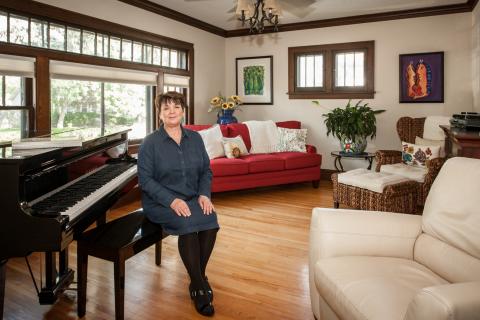
The Wonderful World of Heidi

Heidi Barajas, former executive director of the University’s Robert J. Jones Urban Research and Outreach-Engagement Center (UROC), loves all things Disney so much that her laptop’s desktop picture is of Tinker Bell and her favorite song is When You Wish Upon a Star. To those who might find these things silly, Barajas simply says, “Everybody needs some magic every day.” And by all accounts, that kind of warm, honest, imaginative attitude is precisely what made her the right person to lead UROC from 2010 until June of this year when she accepted a new position as chair of the Department of Organizational Leadership, Policy, and Development in the College of Education and Human Development (CEHD).
Barajas is already missing UROC, particularly her colleagues, whom she describes as “being willing to take the kind of risks you need to take when you’re running an organization that is essentially an ongoing experiment,” connecting the University with the surrounding community. “We built something in a short time, and we all love how the job means working shoulder to shoulder with people in the community who are doing amazing things. Still, she decided it was time to move on so that a new executive director could foster UROC’s next phase of growth, including increased engagement with communities in St. Paul, other parts of Minneapolis and elsewhere.
Even after all these years, Barajas can’t help looking around her and wondering how she got to where she is. The daughter of a white California highway patrolman and a secretary mom, who is Latina, Barajas was in elementary school when her parents quit their jobs and moved the family from Riverside to Maryville, Missouri, so they could both go back to school to become teachers. “I kind of grew up on a college campus,” Barajas recalls, explaining how the experience made her comfortable with higher education.
A music performance major, she spent 15 years as a classical singer, specializing in opera. She loved singing, but the work required her to sign contracts sometimes years in advance, so after marrying and starting a family, she sang Mozart’s requiem one last time and became a voice teacher that included a stint at Wilmette University in Salem, Oregon. Thirty-eight years old with four young children at home, Barajas knew she needed a career she could rely on, so she went back to school and earned a bachelor’s degree in Spanish, planning to be a teacher. But disillusionment with the public school system, and encouragement from some of her professors changed that trajectory. “A Chicano scholar I was working with told me that I was a ‘deep thinker’ and that I should really go to grad school, so I was like, ‘What’s grad school?’” says Barajas, who now holds a Ph.D. in sociology from the U as a National Science Foundation Fellow; as well as a B.A. in Spanish and education and a master's degree in sociology from the University of Utah.
Though she was not a first-generation college student, Barajas was completely unfamiliar with the notion of graduate school, and was struggling with being one of only a few students of color in her classes. She’s never forgotten how uncomfortable she felt at times. “I remember that during my orientation a student used the word nebulous, and I went home and cried because I didn’t know what nebulous meant,” she says. “I thought I wasn’t smart enough to be in grad school, but I realized the importance of doing post-baccalaureate work.”
Doing her own data collection and researching how to get the funding she needed, Barajas often felt like she alone was in charge of her own learning. Unaware of how hard it can be to raise money for post-baccalaureate study, she applied for National Science Foundation Fellowship and got it. So she and her family moved to Minnesota where, after earning her Ph.D., she became an associate professor of sociology, earning tenure in 2005. Next she was made chair of Post Secondary Teaching and Learning, and then associate dean of CEHD. Two years later, in 2010, she reluctantly agreed to be a part of three-person interim team leading UROC after the founding director stepped down and Robert J. Jones asked her repeatedly to take the job. “I thought I was not qualified because I came to this career late in life, so there are gaps for me when it comes to being an academic,” she recalls.
Nine months later she applied for the executive director position and got it after explaining to the hiring committee that for UROC to succeed it must do more than theoretical research. “I said I felt really strongly that we had to act,” she says. “I told them that ‘talking isn’t enough. We have to have goals and we have to take action.’ So they hired me, and I was stunned.” Over the years, UROC has acted in collaboration with the community in myriad ways and at Barajas’ job has been complicated and difficult. But she is glad she can say that she has always been honest with people, even when that meant getting yelled at. “Good relationships survive that kind of transparency,” she says, adding that the “failure would have been to pretend.”
Ultimately, Barajas is proud that she left at a time when so many of UROC’s ongoing projects are having a positive impact. And she’s not worried at all about UROC’s future, but she does want to remind people that it is unique in the entire country and what has been accomplished has been remarkable. “As I move on,” she says, I think about the opera singer, Beverly Sills. She wore a necklace that says ‘I’ve done that,’ and she went out at the height of her career. I feel very strongly that I’m doing the same thing, and I’m feeling really good about it.”